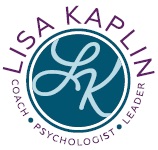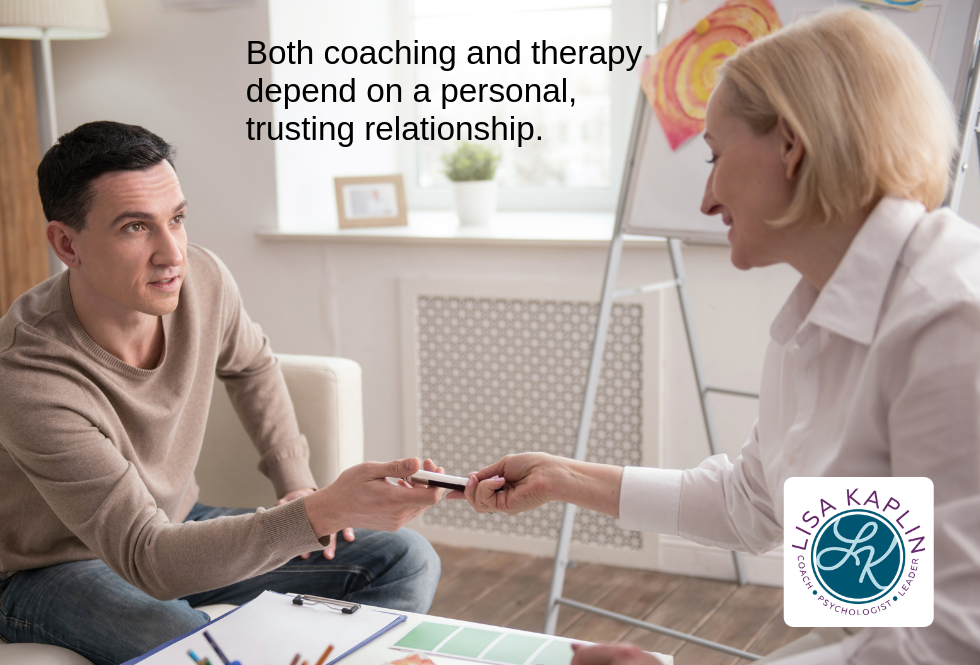Since I am both a psychologist and a professional coach, I am constantly asked about the difference between therapy and coaching. It’s a great question, and one that any consumer should be asking. It’s also important for therapists and coaches to be clear on this so they are not stepping on each other’s toes and they are finding ways to collaborate and serve people in the best way possible.
First, let’s talk about the similarities. Both therapy and coaching are based on a confidential and trusting relationship. Therapists and coaches both commit to complete confidentiality, unless they have reason to believe that their client is going to harm themselves or anyone else. The relationship is at the heart of where change comes from in that trusting someone with your deepest thoughts and feelings requires complete confidence and a sense of safety.
Both therapists and coaches are also devoted to helping people have awareness and insight into themselves and why they do what they do. Many therapy modalities are based on a cognitive behavioral model and almost all coaching modalities utilize that model. The model focuses on awareness of our thoughts and feelings and how those lead to how we behave or show up in life.
Where the differences come in is both within sessions and the focus of between session activities. Therapy is typically much more process-oriented in that clients have awareness of something in the past and then process feelings and thoughts around those awareness areas. Coaching also focuses on awareness, but not much on processing. Coaching focuses on forward moving steps with the awareness. This is why trauma, addiction, and major psychological diagnosis are not appropriate for coaching. Also, coaches are not trained or educated sufficiently in these areas.
Coaching focuses on awareness, action, and accountability. A skilled, professional coach will guide a client into awareness, how it leads to future action, and helping that client stay accountable to behavioral changes for the future. Core components of coaching focus on holding the client’s agenda and accountability around change. Some therapists may utilize this model, but most therapists take the role of the expert and utilize their expertise to lead clients into awareness. This sounds like a subtle difference, but it really isn’t. In therapy, the therapist is the expert and in coaching, the client is.
Coaching is future-focused and emphasizes awareness, action, and accountability. #coaching #therapy #self-improvement Click To TweetTherapy often focuses on the past and possibly on dysfunction or illness, whereas coaching is a wellness model and focuses on the future. Both are extraordinarily beneficial. Simply having someone be fully present and listening to one’s concerns can lead to powerful change and satisfaction in life. I highly recommend both or either depending on what someone would like to work on.
Choosing the Coach or Therapist Who’s Right for You
One final piece of advice…Coaching is far less regulated than therapy, so if you are seeking a coach, make sure they have been trained by an ICF accredited coaching school. Many people call themselves coaches, but have no formal coach training. Therapists should be licensed by the state they are practicing in and typically able to take third party payments, whereas coaches work on a fee for service basis.
Therapists and coaches can also support each other by being clear on when a referral is appropriate or even a powerful collaborative relationship. I no longer provide therapy, but I value my relationship with other therapists as reciprocal referral sources. These reciprocal relationships benefit clients most of all by giving them as many resources as possible.
My advice to anyone considering either coaching or therapy is to have conversations with a number of coaches and therapists. Ask lots of questions, understand the process and what realistic outcomes might look like. Look for a good fit by both the person’s theory and process, but also around the connection you have with them. A good connection is the key to success in either setting.
Please let me know if you have any questions.
Love,

Lisa Kaplin Psy. D. PCC

